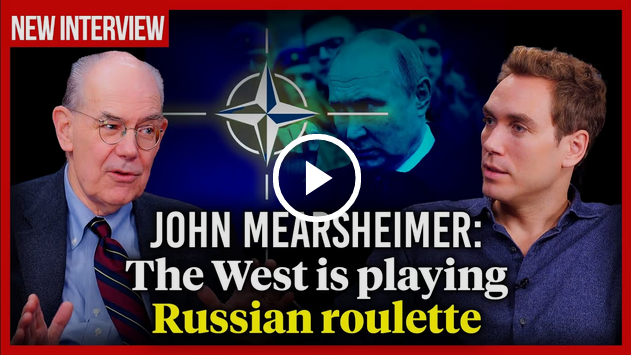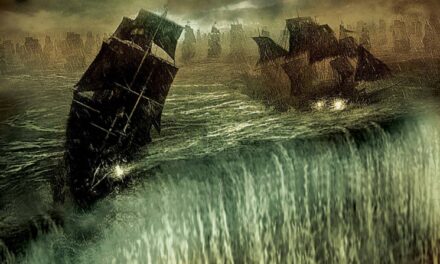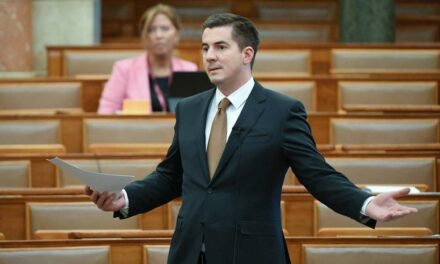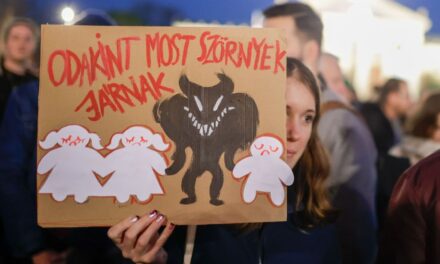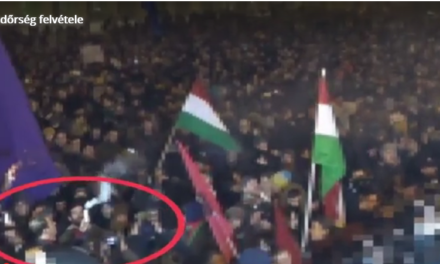The West sucked him in, says the realist foreign policy scholar in his interview with UnHerd, where he talks about his meeting with Viktor Orbán, among other things.
Until the Russian-Ukrainian crisis, Professor John Mearsheimer was primarily known in academic circles as a leading scholar of the realist foreign policy school. This means that he interprets world politics as a fierce competition between great powers for regional hegemony.
However, due to the "Maidan revolution" in Ukraine in 2014 and the Russian invasion in February of this year, he became a role model for millions of people around the world who have doubts about whether the West is acting wisely in relation to the events in Ukraine. A lecture he gave in 2015, entitled "Why the West is to blame for Ukraine", has so far attracted 28 million views on YouTube.
His main argument - that by expanding NATO eastward and inviting Ukraine to join the bloc, the West (and especially the US) created an intolerable situation for Vladimir Putin that would inevitably result in Russia taking steps to "destroy" Ukraine - is now politically incorrect . His critics accuse him of being a pro-Putin apologist, but his supporters believe that the invasion is proof that he was right all along.
What have we learned since the February invasion began? Are you still claiming there is no evidence that Russia had ambitions to conquer Ukraine? How else could we interpret the shocking moment when it became clear that the Russians were launching a full-scale invasion?
The Russians invaded Ukraine with no more than 190,000 soldiers. They made no effort to conquer the whole country. They weren't even close to him. It is impossible that they would have conquered Ukraine with 190,000 soldiers. And they didn't even have enough reserves to do that. When the Germans invaded Poland in 1939, they occupied it with 1.5 million soldiers. Such an army is needed to conquer and occupy a country like Ukraine, and then a larger one to merge it into Russia. You need a huge army. It was a limited strategy.
In this case, what was the limited purpose?
From the beginning, the Russians said they wanted a neutral Ukraine. And if they don't get a neutral Ukraine, they will create a dysfunctional dwarf state. They occupied huge territories in the east, annexed them, they are now part of Russia. At the same time, they are destroying the Ukrainian infrastructure. They are destroying the Ukrainian economy. It is sickening to see what is happening to Ukraine.
This assessment of his is very different from the news we hear every day about Ukrainian successes and Russian retreats. By most accounts, the underdog nation does amazingly well against the aggressor. Is it possible that the realist world view is defeated by the moral conviction of the people defending their homeland?
The key word is nationalism. There is no doubt that when the Russians invaded Ukraine, nationalism came to the fore at lightning speed, and that Ukrainian nationalism is a strengthening factor. There is also no doubt that nationalism is not part of my realist theory of international politics, but nationalism is consistent with realism. Nationalism and realism go together quite well. But the main thing that should not be forgotten is that nationalism also plays a role on the Russian side. And the more time passes, and the more the Russians feel that the West has them in the crosshairs and not only tries to defeat it, but also wants to push Russia out of the ranks of the great powers, the more Russian nationalism kicks in. We must be very careful not to judge the outcome of the war at this moment. This war will continue for a long time and will play out in ways that are difficult to predict. But I think there is a good chance that the Russians will win in the end.
In the rest of the conversation, Mearsheimer says that the possibility of peace has been lost and that there is no realistic deal that could be reached in Ukraine. Russia will not give up its gains in eastern Ukraine, and the West cannot tolerate further occupation; meanwhile, a neutral Ukraine is also impossible, since the only power that would be able to guarantee this neutrality is the USA, which of course would be intolerable for Russia. As he puts it succinctly: "There are no realistic options. We screwed up.”
According to him, the war will continue to escalate, and the nuclear threat is "not trivial".
“If the Russians were to deploy nuclear weapons, the most likely scenario is that they would do it in Ukraine. And Ukraine has no nuclear weapons of its own. So the Ukrainians would not be able to retaliate against the Russians with their own nuclear weapons, they have no deterrent and this weakens them. In addition, if the Russians were to use nuclear weapons in Ukraine, the West - and here we are primarily talking about the United States - will not use nuclear weapons in retaliation, because that would lead to a general thermonuclear war."
Mearsheimer admits that in this scenario the West cannot rely on restraint, and that the chances of a catastrophic escalation remain high, so he considers the current rhetoric of Western leaders about defeating Russia to be foolish.
According to his assessment, British politics is the number one voice that encourages the United States to act more strongly.
"I think the British are blatantly stupid, as are the Poles, the Baltic states and the Americans."
Meanwhile, Sweden and Finland are making the situation even more dangerous by applying for NATO membership. That Russia is ready to overrun Finland or Sweden is only a figment of the West's imagination, but their joining the security pact adds to Russia's sense of being deliberately encircled. He believes that their request should be rejected and that no one has a subjective "right" to join a security pact like NATO.
Mearsheimer's logic points in the same direction: if peace is not possible now, then the fighting will continue, which logically leads to escalation, especially if Russia seems to be losing; the escalation could easily go nuclear in the end, and then the possibility of a great power nuclear conflict is realized.
When asked if Ukraine were to become stronger and nuclear weapons were not deployed, the professor would admit that he was wrong, he replied that
"Naturally. The world of international politics is a kind of radical uncertainty, where it is very difficult to guess what the future will look like, very difficult to predict. Is there a chance that the Russians will give in? A little yes. But I also think that the chance that all this could lead to nuclear war is not negligible. And when we think about the consequences of nuclear war, I think we have to be extremely careful. Let me illustrate this with the following analogy:
if I have a 100-gauge pistol with five rounds and I tell you I'm going to pull the trigger while putting the gun to your head, but don't worry because there's only a 5 percent chance I'll kill you, will you be upset? This is the question you need to ask yourself. Are you going to be scared to death? The consequences here mean nuclear war, if I am right, albeit in the unlikely event.
When asked where he would draw the line in the face of a nuclear power, he answered that NATO countries must be protected in any case, despite the risks.
"The Baltic states are in NATO. Poland and Romania are also members of NATO. They have the guarantee according to Article 5. If the Russians were to attack these countries, we would have to defend them, that's not a question. I would support that.”
Even more surprisingly, on the subject of China and Taiwan, which one might think resembles Russia and Ukraine as a smaller, Western-backed entity in the orbit of a rival regional hegemon, he takes the opposite view.
"Fundamentally, I have a different opinion about China than I do about Russia, so I think differently about Taiwan than I do about Ukraine. I believe that China is an equal competitor to the United States and threatens to dominate Asia the way the United States dominates the Western Hemisphere. From an American point of view, this is unacceptable. And I think that's okay. I don't think the US wants China to dominate Asia the way we dominate the Western Hemisphere. We will do everything we can to contain China, so protecting Taiwan is important to us.”
Mearsheimerism is therefore not quite what either its followers or its opponents think. Not an anti-war doctrine (the branch of "offensive realism" specifically regards aggression as a means necessary for the survival of great powers); and he is not fundamentally skeptical of American power.
He supports Americans exercising their power in their own interests, but he believes that the war in Ukraine is distracting from the real threat, which is China, and worse, that Russia is drifting into China's arms in the process, even though it would be in America's best interest to separate them.
Mearsheimer also said - contrary to what was published in the New Yorker - that he was in Hungary to promote his new book, and that the Hungarian Prime Minister requested the meeting through the publisher. And he seized the opportunity and ended up having a three-hour conversation with Viktor Orbán.
“I really wanted to talk to him for two reasons. One is that I was curious about his views on Ukraine and how his views compare to the views of other European leaders and where he thinks this is going. But I was also very interested in talking to him about nationalism and liberalism, the relationship between these two isms , because this is one of the central themes of my book.
What I have in common with Orbán is that he thinks nationalism is a very important force, and I agree with him.
But what I disagree with is that I think liberalism is very strong and that's a good thing. He, on the other hand, despises liberalism, sees it as the exact opposite of nationalism, and prefers nationalism and wants to crush liberalism. I, on the other hand, see nationalism and liberalism as two ideologies that differ from each other in important respects, but are nevertheless able to coexist."
When asked if he is not worried that because of such meetings he will be seen not as an analyst but as a political activist, he answers that he is not an activist.
"I am an academic, a scientist. And this is part of my research. My goal is to understand what is going on in Europe. I do not approve or condemn the politics of Viktor Orbán, I simply talk to him to understand what is going on in his mind, what is going on in Hungary and what is going on in Europe in general.
The fact that they are trying to smear me because I spoke to Viktor Orbán is hardly surprising in the context in which we operate now, because people these days are really not that interested in talking about facts and logic. They prefer to smear those with whom they disagree.”
When asked if "this uncertain, multipolar world is here to stay, and if so, is it a good thing," he says that he will definitely stay with us.
“And I think it will be more dangerous than the Cold War was. I was born and raised during the Cold War, and the world was bipolar at the time, with the United States against the Soviet Union. In the unipolar moment, only the single pole, the United States, remained. And today there are three great powers, the USA, China and Russia. In a unipolar world, there could be no great power politics, because there was only one great power. What we have today is the US-China competition in East Asia and the US-Russia competition, mainly over Ukraine, this is a double conflict. And I would argue that this is individually more dangerous than the Cold War conflict.
It is easier to imagine a war between the US and China in East Asia and a war involving the US and Russia in Ukraine than it was during the Cold War in Europe or East Asia between the US and the Soviet Union.
So I think we live in much more dangerous times today than during the Cold War, and certainly more dangerous than during the unipolar moment. And I also think that if anything, this situation is only going to get worse. But I hope I'm wrong.”

